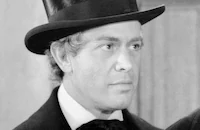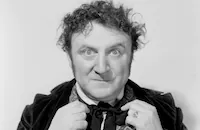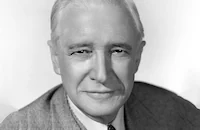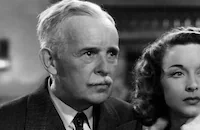Evelyn Prentice

Brief Synopsis
Cast & Crew
William K. Howard
William Powell
Myrna Loy
Una Merkel
Rosalind Russell
Isabel Jewel
Film Details
Technical Specs

Synopsis
Although she loves her husband, prominent defense attorney John Prentice, and is confident that he loves her, Evelyn Prentice bemoans his long working hours. While John is preoccupied with acquitting the seductive Mrs. Nancy Harrison, a socialite on trial for manslaughter, Evelyn is approached in a nightclub by gigolo Lawrence Kennard. Later, after John finds himself on the same Boston-bound train as Nancy, Evelyn receives a book of Kennard's poetry and an invitation to tea. At the urging of her best friend, Amy Drexel, Evelyn accepts Kennard's invitation but maintains her loyalty to her husband. Soon after John returns from Boston, Evelyn receives a package containing a woman's watch, which has been inscribed "To Nancy, from John," and a note from the train company explaining that the watch was found in John's drawing room. Devastated, Evelyn has another rendezvous with Kennard but, before she has compromised herself, tells him that their flirtation is over. Amy, meanwhile, shows Nancy's watch to John, who tells her that Nancy planted it in his room to destroy his marriage. Although neither John nor Evelyn discuss the watch, they both agree to take a long trip to Europe with their daughter Dorothy. Before they leave, however, Kennard telephones Evelyn and demands that she come to his apartment. There, Kennard shows Evelyn three letters that she had written to him and insists on $15,000 in blackmail payment. In spite of the relative innocence of the letters, Evelyn panics and grabs a gun from an open desk drawer. At that moment, Judith Wilson, Kennard's abused girl friend, enters the apartment's back door and hears a gunshot in the next room. Before Judith sees her, Evelyn rushes out the front door and returns home, determined to reveal nothing to John. However, when she learns that Judith has been accused of killing Kennard, Evelyn convinces John to forego their trip to Europe and defend Judith. From Judith, John learns first that Kennard was seeing the "wife of a prominent man" and then later that he had kept a diary. While John's investigator tracks down the diary, Evelyn grows more and more uneasy about Judith's chances of acquittal. Then on the last day of the trial, Evelyn decides to tell the truth and goes with Amy to the court. During the district attorney's summation, John receives Kennard's diary, in which Evelyn is identified as "the prominent wife." At the same time, Evelyn, unable to endure the prosecutor's attack on Judith, interrupts the proceedings and demands to be heard. Although John tries to block her testimony, Evelyn confesses that, during a struggle with Kennard, the gun went off accidentally, apparently hitting Kennard. To the surprise of the court, John questions Judith and, using Evelyn's testimony against her, forces her to admit that she had shot Kennard after Evelyn had left. John convinces the jury that Judith killed Kennard in self-defense, and then informs Evelyn that all is forgiven and forgotten.

Director

William K. Howard
Cast

William Powell

Myrna Loy

Una Merkel

Rosalind Russell

Isabel Jewel

Harvey Stephens

Edward Brophy

Henry Wadsworth
Cora Sue Collins

Frank Conroy

Jessie Ralph
Perry Ivins
Sam Flint
Pat O'malley
J. P. Mcgowan
Jack Mulhall
Clarence Hummel Wilson
Mariska Aldrich

Herman Bing
Garry Owen
Phil Tead
Wilbur Mack
Francis Macdonald
James Mack
Milton Owen

Samuel S. Hinds
Georgia Caine
John Hyams

Howard Hickman
Richard Tucker
Sam Mcdaniel

Billy Gilbert
Rolfe Sedan
Sherry Hall
George Chandler
Stanley Andrews
Matty Roubert
Crew
Charles G. Clarke
Lenore Coffee
John W. Considine Jr.
Cedric Gibbons
Arnold Gillespie
Horace Hough
Frank Hull
Oscar Radin
Howard Emmett Rogers
Douglas Shearer
Dolly Tree
Edwin B. Willis

Film Details
Technical Specs

Articles
Evelyn Prentice
Loy had been playing oriental vamps and other women since the silent era, and had hoped that when she signed a contract with MGM in 1931, her fortunes would improve. Her first pairing with Powell, in Manhattan Melodrama (1934), was the beginning of the turnaround, and also the beginning of her typecasting as the Perfect Wife. In that film, she first loves bad guy Clark Gable, but marries his best friend, good guy Powell, who ends up becoming the governor. Loy recalled that the chemistry between her and Powell was instant, and instinctive. "He was so naturally witty and outrageous that I stayed somewhat detached, always a little incredulous. From that very first scene, a curious thing passed between us, a feeling of rhythm, complete understanding, and instinct for how one could bring out the best in the other." Their chemistry really exploded in The Thin Man, and from then on, Powell and Loy were a great screen team.
MGM spared no expense in the production of Evelyn Prentice, giving the film its typical MGM high-gloss look. There was a strong supporting cast, with dependable veterans like Una Merkel, Jessie Ralph, and Edward Brophy joined by a newcomer, Rosalind Russell, in her film debut. Russell played a woman with whom Powell has an affair. Russell became extremely fond of Powell, and grateful to him for his helpfulness and kindness. In her memoirs, Russell recalls being cast opposite Powell in Rendezvous (1935). She told Powell she knew that he'd rather have Loy in the part, and he replied, "I love Myrna, but I think this is good for you, and I'm glad we're doing it together."
Russell had no scenes with Loy in Evelyn Prentice, but the two also became good friends. Since they were the same type, MGM would use Russell as a threat to Loy when Loy was being uncooperative, but it did not affect their friendship. The two women were neighbors, and once at a party, Russell teased Loy about getting all her rejected scripts. "You 'd wait until dark, shove 'em out of your house, and they'd roll down the hill and hit my front door, and that's the way they were cast." Loy replied, "Well, you must have been out the night I rolled you Parnell," referring to the infamous 1937 flop in which Loy co-starred with Clark Gable.
Evelyn Prentice was not the disaster Parnell would be, but critics were not terribly fond of it either. They did, however, take note of the fine performances by both Powell and Loy, and were particularly impressed by how well Loy handled her role's heavy emotionalism. It was one of the few times at this point in her career that Loy was allowed to show that she was a fine dramatic actress. But after Evelyn Prentice, it was back to comedy and happy on-screen marriages for one of the most beloved teams in films. William Powell and Myrna Loy would play husband and wife a total of thirteen times.
Director: William K. Howard
Producer: John W. Considine, Jr.
Screenplay: Lenore J. Coffee, based on the novel by W.E. Woodward
Cinematography: Charles G. Clarke
Editor: Frank Hull
Costume Design: Dolly Tree
Art Direction: Cedric Gibbons
Music: Oscar Raclin
Principal Cast: Myrna Loy (Evelyn Prentice), William Powell (John Prentice), Una Merkel (Amy Drexel), Harvey Stephens (Lawrence Kennard), Isabel Jewell (Judith Wilson), Rosalind Russell (Nancy Harrison), Edward Brophy (Eddie Delaney), Cora Sue Collins (Dorothy Prentice), Jessie Ralph (Mrs. Blake).
BW-79m. Closed captioning.
by Margarita Landazuri

Evelyn Prentice
Myrna Loy & Wiliiam Powell in Evelyn Prentice on DVD
And it is a drama, one of only two full-fledged dramas the pair made together. (The other, Manhattan Melodrama, 1934, is also in this set.) Powell plays a workaholic lawyer whose time away from home is ruining his marriage to Loy, with whom he has a young daughter. The pair start to drift apart. Rosalind Russell (in her film debut) seduces Powell after he wins her acquittal in a murder case, and Loy falls under the charms of a shady, mysterious stranger played by Harvey Stephens (who bears an uncanny resemblance to Warren Beatty!). Stephens turns out to be an utter cad who seduces married women only to blackmail them for cash. Tragedy ensues, and Powell finds himself defending his wife in court.
Una Merkel is on hand with her usual sassy dialogue, playing Loy's confidante, as is popular character actor Edward Brophy as one of Powell's assistants. But it's Powell and Loy's totally convincing chemistry that makes Evelyn Prentice work and remain reasonably compelling. Loy especially shows fine range as she registers despair and increasing guilt.
The two stars had just made The Thin Man (1934), and they are still urbane and sophisticated as husband-and-wife in Evelyn Prentice - they just don't get as much witty banter. After this picture, Powell and Loy's pairings pretty much alternated between Thin Man films and non-Thin Man films, while each continued to work on other movies, too. Loy later recalled, "I never enjoyed my work more than when I worked with William Powell. He was a brilliant actor, a delightful companion, a great friend and, above all, a true gentleman."
Ultimately, Evelyn Prentice is far from the best of the five titles in this new set, but it's also far from bad. It comes with three extras: a short subject, Goofy Movies #3, a cartoon, Discontented Canary, and a trailer. The other four movies on hand are all non-Thin Man movies: Manhattan Melodrama (1934), Double Wedding (1937), I Love You Again (1940) and Love Crazy (1941).
For more information about Evelyn Prentice, visit Warner Video. To order Evelyn Prentice (available only as part of the Myrna Loy/William Powell Collection), go to TCM Shopping.
by Jeremy Arnold
Myrna Loy & Wiliiam Powell in Evelyn Prentice on DVD
Quotes
Trivia
Notes
Rosalind Russell (1907-1976) made her screen debut in Evelyn Prentice, which also was the first film in which Myrna Loy and William Powell co-starred after their successful pairing in The Thin Man (see below). According to a mid-September 1934 Hollywood Reporter production chart, Howard Emmett Rogers "adapted" Woodward's novel, but his contribution to the final film has not been determined. Hollywood Reporter production charts add the following actors to the cast list: Claudelle Kaye, Ruth Renick, Pasquali, Billy Sullivan, Crauford Kent and Joe Keaton. Their appearance in the final film has not been confirmed. M-G-M remade W. E. Woodward's book in 1939 as Stronger Than Desire .















